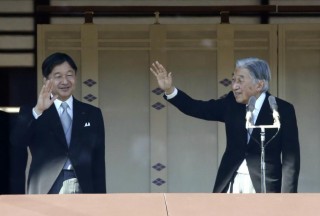Loading
Search
▼ Japan to Celebrate New Emperor's Accession in Rites, Parade in Oct 2019
- Category:Event
TOKYO - The government decided Friday to stage a ceremony in October next year to mark Crown Prince Naruhito's accession to the throne, but said female imperial family members will not attend one of the key enthronement rituals.
The enthronement ceremony for the new emperor, now 58, is planned for Oct 22, 2019 as a state occasion, after he succeeds to the Chrysanthemum Throne on May 1 that year, a day after Emperor Akihito steps down, according to a basic government plan on imperial succession rites.
Chief Cabinet Secretary Yoshihide Suga said only male imperial family members will attend the ritual on May 1 next year, in which the new emperor will inherit traditional regalia, based on the example of the previous succession in 1989.
The imperial family has traditionally only allowed male members to attend this ritual because the Imperial House Law stipulates only males can ascend the throne, according to government sources. But critics say excluding female members would be out of touch with the times.
In contrast, the government is considering allowing female cabinet ministers, currently numbering two, to take part in the rite on the grounds they are unrelated to the imperial succession and would be attending as observers, the sources said.
During the ritual, the new emperor will inherit regalia such as the sacred sword and jewels as proof of accession to the throne. When Emperor Akihito succeeded to the throne in January 1989 following the death of his father Emperor Hirohito, the attendants -- composed of members of the imperial family and top government officials -- were all male.
Suga also said the Imperial Household Agency is considering holding "Daijosai," or Grand Thanksgiving rite, on Nov 14-15, 2019. During the event -- the most important imperial ritual following his enthronement -- the new emperor will eat rice harvested in the year to appreciate the country's bounty of grain.
For Prince Akishino, the younger son of the 84-year-old emperor, the government has also decided to hold a ritual in 2020 to commemorate his promotion to "koshi," the title given to the first in line to the throne. But its exact timing has yet to be fixed.
"The cabinet will come together to make preparations so that the abdication and succession can be completed smoothly," Suga said at a press conference.
The top government spokesman said a new committee will be set up in the fall this year to work out specific details of each rite. The basic plan on succession events will be officially endorsed by the cabinet of Prime Minister Shinzo Abe next Tuesday, he added.
Suga declined to elaborate on another contentious point of whether minor imperial family members, specifically the emperor's 11-year-old grandson Prince Hisahito, will join a series of events. It has been customary for minor members not to attend succession rites.
Prince Hisahito, the son of Prince Akishino, 52, will be the second in line to the throne after the abdication of Emperor Akihito. Suga said the envisioned preparation panel will "properly judge" on the matter.
Ahead of the first abdication by a Japanese emperor in more than two centuries, the government will stage a ceremony to mark Emperor Akihito's 30 years on the throne on Feb. 24 next year in Tokyo's National Theater. The current era of Heisei under the emperor will end in its 31st year.
On April 30, 2019, an abdication ceremony will be held for Emperor Akihito as a state occasion, in which he will meet with the prime minister, Diet leaders and others representing the Japanese people in the Imperial Palace.
Foreign dignitaries and envoys are expected to attend the incoming emperor's enthronement ceremony, which is aimed at proclaiming the imperial succession at home and abroad, followed by a parade and a banquet.
On Oct 23, 2019, the prime minister is set to host a dinner party in Tokyo to express Japan's gratitude for the foreign guests' attendance at the celebratory events.
The outgoing emperor, who has undergone heart surgery and treatment for prostate cancer, signaled his wishes to retire in a rare video message in August 2016, citing concerns about his advanced age and weakening health that could prevent him from fulfilling his duties.
Japan's parliament enacted a one-off law last June enabling him to pass his status to the next generation. The special legislation was needed as the Imperial House Law lacks a provision on the emperor's abdication.
Crown Prince Naruhito is set to become the 126th emperor in the world's oldest hereditary monarchy believed to stretch back more than 2,600 years, including legendary figures whose existence is disputed.
© KYODO
- March 31, 2018
- Comment (0)
- Trackback(0)


